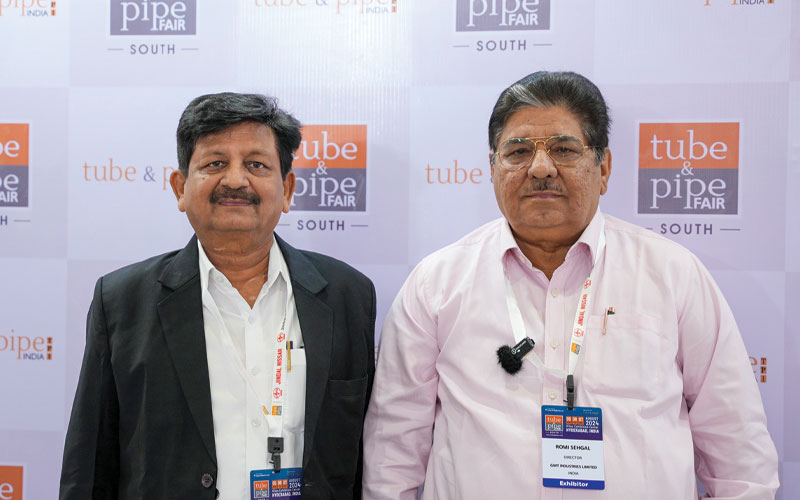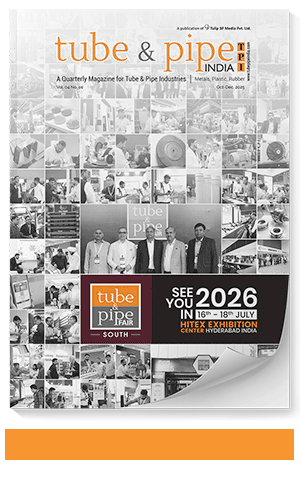GMT Industries is planning to double up its manufacturing capacity and reach a revenue of INR 250-300 crore in the next 2 years. It is coming up with a new manufacturing facility in Faridabad, establishing a new state-of-the-art machine shop to build more than 80 percent components in-house, purchasing latest technologies, and looking forward to becoming one of the few manufacturers of API pipe mills in India. During a joint interaction with Tube & Pipe India, Mr. Rakesh Kumar Bansal, Director, GMT Industries Limited and Mr. Romi Sehgal, Managing Director, SG Tech Engineering (part of APL Apollo Tubes Limited), discussed their 16-year-old partnership.

Tube & Pipe India: Kindly Walk us through the illustrious business journey of GMT, highlighting major milestones and crucial achievements. Also give information about your 16-year-old partnership with APL Apollo.
Rakesh Kumar Bansal: GMT Industries was started in 2008 by a group of professionals to do fabrication and machinery work. APL Apollo gave us the opportunity to manufacture tube and pipe mills which turned out to be a very successful venture. Today, we manufacture approximately 36 tube mills in a year, along with slitting lines, cut-to-length lines, hydrotesters and straightening machines, all for the steel industry. It’s a 16-year-old partnership, which has remained fruitful to date.
TPI: What prompted APL Apollo to invest in GMT Industries?
Romi Sehgal: All the Directors in GMT Industries were earlier working for Gallium Industries Limited in JV with Japanese Company Kusakabe in Faridabad. I was also there as the head of production. They brought in a lot of new technology. They had some financial problems and gradually closed down. During those times, APL Apollo Tubes Limited, which SG Tech Engineering is a part of, was eyeing a lot of new segments in India. Nobody was making tubes for those segments. Replacement of the structural steel, channels and angles was pioneered by APL Apollo. We wanted some company to make equipment according to our requirement, not as per standard. We could have collaborated with an Italian or a European company, but that would have taken a lot of energy and time. In the equipment industry, unless you have orders, you cannot just make the machine and keep it for selling on the shelf. It requires a lot of money. We wanted somebody in India to give us the equipment and technology required for our expansion. So we thought about GMT Industries and entered into a collaboration with them. Our partnership started with a single tube mill and today, we have about 25-30 mills from GMT Industries. Apart from standard mills, GMT Industries has provided us with new equipment and machines, designed and customized as per our requirement. It has been a win-win situation for both of us.
TPI: After this investment, how would you describe GMT’s position in the tube and pipe industry?
RKB: Both, our company and our network, have grown exponentially after collaborating with APL Apollo. It also set the stage for expansion and new ventures. We have purchased a 3.6-acre patch on Mathura Road, about 20 kilometers from our existing plant in Faridabad, to build a large factory. As our order book swelled, we found it difficult to run the business from our existing setup. We are also establishing a state-of-the-art machine shop containing all CNC imported machines. It will reduce our dependence on vendors and suppliers. We will build 80-90 percent components of the machines in-house and get around 10-20 percent through outsourcing. It will improve the quality of our machines. We are also investing in technical collaborations. We purchased 2-3 new technologies recently. In future, we hope to bring the latest technologies like flexible forming, cage forming and bigger API machines to India.
TPI: What kind of production capacity are you looking at?
RKB: In terms of finances, we are working on INR 100-125 crore right now. With the new premises, machine shop and new technologies, we are very much hopeful that within a span of 1-1.5 years, we will double our production capacity and reach a revenue of INR 250-300 crore.
Our profit margin will go up, our EBITDA will increase and we will grow at a fast pace.
TPI: What are some of the factors that have enabled GMT Industries to achieve its current growth and market positioning?
RS: Since its inception, GMT Industries has been continuously improving its quality. They are a bunch of honest professionals, who work with unmatched dedication and focus. Once they get an order, they make all-out efforts to finish it on time. APL Apollo buys a lot of equipment from GMT. Till date, we never faced any problems. Our idea behind supporting them was to fulfill our equipment manufacturing needs in India, rather than approaching Europe or China. We supported GMT Industries for our benefit and for the market as well. We push them to achieve their targets in the least possible time, as well as improve their equipment, technology and quality.
TPI: What does GMT Industries’ product basket contain? Which are the sectors where your products find application?
RKB: We manufacture ERW tube mills, precision tube mills and stainless-steel tube forming mills. We also produce tube-related equipment, such as slitting lines, horizontal strip accumulators, tube draw benches, push pointer machines, strip shear & welders, rolls, tube straightening machines, tube end facers, annealing equipment, tube hydrotesters, pipe bundling machines, pipe threading machines, servo cut-to-length lines, and cold saws. There are basically two segments of pipe manufacturers in the industry. First are those making structural pipes, such as black pipes, galvanized pipes and pre-galvanized pipes. Second are the companies making precision pipes. We cater to both. Our ERW pipes are primarily used in the manufacturing sector.
Also Read: Xiris Automation: Making Tube & Pipe Manufacturing ‘Defect-Free’
TPI: What kind of policy intervention do you expect from the government for the ease of doing business?
RKB: Though the current government policies, rules and regulations are very good, we expect more business-friendly policies in future for robust growth of our industry. After the introduction of the Goods and Services Tax (GST), doing business has become easier. We are a company that follows all the rules & regulations. We believe that by paying taxes on time, we are aiding the development of our nation. We also comply with all the labor laws, such as the ESI, PF and welfare for the employees, CSR, etc.
RS: Since the equipment manufacturer depends on the end user, the policies should be designed in such a way that they ensure the ease of doing business for the end user rather than the manufacturers.
TPI: What’s your view of the Indian tube and pipe industry in terms of growth and future prospects?
RS: The industry totally depends on how much the government is ready to spend on the infrastructure because tubular products go into a lot of infrastructure requirements. The government has started spending on infrastructure since the last 2-3 years, and the future also seems very good. Also, a lot of new pipe manufacturing companies and new segments are coming in. We are trying to switch the end users from the traditional steel to pipes.
In future, we hope to bring the latest technologies like flexible forming, cage forming and bigger API machines to India.
TPI: What kind of growth figure can we expect?
RS: As per global standards, in a developed country, if 100 tons of steel is produced, out of that about 10 tons is tube. But in India, tube content is around 2 tons, reflecting a gap. So, as we develop, that gap will be narrowed. There’s a lot of scope, potential and space for new companies and for new segments.
TPI: Where do you see GMT Industries five years down the line?
RKB: In the next five years, we will quadruple our production capacity. India is a developing country and per capita steel consumption is not at par with developed countries. We see a lot of scope in India because there are a lot of tube mills, pipe mills, steam and pipe material available here. Besides, we are planning to acquire new technologies like manufacturing of spiral saw welded pipes and API pipes. There are only a few factories currently manufacturing spiral saw welded pipes in the country. The same goes for API pipe mills. Many companies go out of India to buy mills for API pipes, which are mainly used in the oil and gas sector. We see this as a great opportunity.
TPI: What is your takeaway from the second edition of Tube and Pipe Fair in Hyderabad?
RS: It has been a good experience. The set-up has attracted a lot of visitors and received several serious inquiries. Such a footfall in a place like Hyderabad is commendable.
RKB: GMT Industries is participating for the first time. It’s a good platform for companies like us. The ambience, footfall, set-up, everything looks good. We hope to make lasting connections and collaborations during TPF 2024. It’s not just visitors, real customers are coming here, even from overseas.










